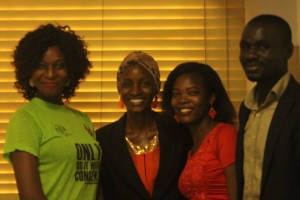 SPACES FOR CHANGE joined advocates around the globe to commemorate the ‘International Day for the Elimination of Violence against Women’. That day is set aside to create awareness on issues around gender-based violence (GBV), highlighting affirmative action that may be taken to bring the menace to an end.
SPACES FOR CHANGE joined advocates around the globe to commemorate the ‘International Day for the Elimination of Violence against Women’. That day is set aside to create awareness on issues around gender-based violence (GBV), highlighting affirmative action that may be taken to bring the menace to an end.
The 16-day #orange the world campaign to mark 2016 International Day for the Elimination of Violence against Women, started on 25 November, 2016, and terminated on the 10 of December, which is the Human Rights Day. The United Nations Organisation (UNO) dedicated the 16 Days of Activism against Gender-Based Violence Campaign to galvanize action to end violence against women and girls around the world.
On December 7, 2016, SPACES FOR CHANGE staff paid a courtesy call on the officials of the Lagos State Domestic and Sexual Violence Response Team (DSVRT) at their Lagos office. The agency operates a Public-Private-Partnership comprised of several bodies including the Nigeria Police, Office of the Public Defender, State Ministry of Justice, Non-Governmental Organisations (such as the Mirabel Centre), among others. The DSVRT also enlists key stakeholders such as traditional leaders to serve as first responders to incidents of gender-based violence. This is necessary because the prevalent traditional mores hold the traditional leaders as the primary arbiters or mediators of cases involving GBV within rural communities.
Welcoming to them to their office, Lola Vivour-Adeniyi, the Coordinator of the DSVRT explained the strategies the agency deploys to combat the apathy towards seeking legal redress for acts of GBV in the state. The strategies include public awareness campaigns and the establishment of care centres – for example on rescue and shelter of the Ministry of Youth and Social Development. In turn, SPACES FOR CHANGE team discussed the organisation’s ongoing research that is investigating why existing legislations on gender-based (domestic) violence in Nigeria are not effective. They also talked about the plans underway to push for policy changes based on evidence-based research findings.
GBV has assumed an alarming notoriety in the world. A United Nations report states that 1 in 3 women worldwide has experienced some form of physical or sexual violence – mostly by an intimate partner. In Nigeria, the National Bureau of Statistics (NBS) 2009 report shows that one in five women has experienced some form of physical violence. According to the report, women ‘not married’ are more likely to have suffered physical violence than women who have been married. Women in urban areas are also more likely to have experienced violence than those in rural areas. The highest proportion of women who experience physical violence is found in the South-West and South-South. The North East and North-West report relatively fewer cases of domestic violence; although this could also be an indication that violence in households is under-reported.
In June of 2016, the Lagos State Domestic and Sexual Violence Response Team (DSVRT) reported that the state government recorded about 4, 000 cases of domestic abuse, ranging from rape, child abuse, sexual assault ,defilement, divorce and other matrimonial issues, in the past one year. The above data, collated by the DSVRT, captures only reported incidents, which means that there could be many unreported cases, as victims of sexual or domestic violence hardly come forward to report or tell their stories.
Deeply-entrenched patriarchal ideologies have permeated the justice systems in the country, resulting in systematic patterns of gender-based violence in both Nigeria’s northern and southern regions. The increasing vulnerabilities women are facing linger despite legislative reform initiatives, policies, and international human rights treaties which Nigeria has ratified. This understanding is necessary in order to ascertain how reforms could be best structured to effectively protect women through the instrumentality of the law, ensuring that they fully benefit from legislative reforms.



